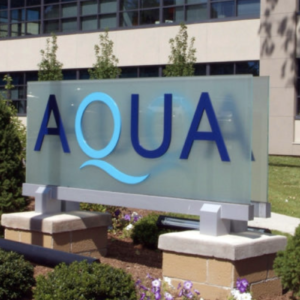As Aqua Pennsylvania pushes to buy the Delaware County Regional Water Authority (DELCORA), residents of nearby Cheltenham Township say their experience with the company could be used as a cautionary tale.
Aqua America Inc.’s Pennsylvania subsidiary, Aqua Pennsylvania Wastewater, purchased the sewers in Cheltenham Township in 2019 for $50.25 million. And the reviews from local residents, businesses, and officials in this Montgomery County community are mixed.
“We live in the Breyer Woods condominium complex and it would appear that we are paying far more than we used to, and we are responsible for our own sewer lines,” said Eric Key.
Samantha Hobson said, “As a tenant, our landlord has started to try to pass that expense on to us, although it’s not in our lease, which was drafted prior to the sale to Aqua. Should be a long, dragged-out issue for me. Ugh.”
“For me, I felt it was inevitable as we certainly couldn’t fund required upgrades ourselves, in the long term,” said Natalie Lynn. “It has been a shift in terms of billing. In the past, those charges were carried through our property taxes and are now direct billed. I imagine that rate increases, as with any utility, are as likely as the next sunrise. As for long-term effectiveness: I haven’t seen a drop in service or capacity as of now, but we shall see moving forward. This, like all aspects of modern community life, is something we have to monitor.”
Traci Brown said, “My thoughts, no one ever wants to pay for the things they can’t see. But like most communities, these systems are long past their date. And no one really understands the importance of the sewer system…especially on the environment.”
Commissioner Irv Brockington believes the township needed to sell the 90-year-old system that had run afoul of state environmental regulations.
“It was a tough decision for me,” said Brockington. “But we were not capable of managing the system the way it needed to be. We did not have the money to do that.” The township used the $50.25 million from selling its sewers to “pay bills,” including debt it incurred over the years.
Aqua bills residents monthly with their water bill for sewer charges, rather than annually as the township did. Cheltenham residents may experience a sticker shock next year since Aqua will be able to petition the state Public Utilities Commission to allow it to raise rates in 2022, recouping expenses incurred from upgrading the sewer pipes. Sales of public sewer systems began in 2016 after the state law was changed to permit them.
In the past, most townships funded these sorts of infrastructure projects by floating bonds. Some still do. For example, the Radnor Board of Commissioners spurned a similar offer from Aqua in 2018 in favor of paying for sewer repairs through borrowing. However, Commissioner Jake Abel said the town’s BOC will revisit that issue sometime this year.
Commissioner Richard Booker concurred, saying bureaucrats tend to think selling sewer systems is a good idea but it leaves the ratepayers eventually paying double or triple. Selling the system to a for-profit entity “will deliver the taxpayers bound and gagged to a monopoly,” said Booker, who hopes to work with other commissioners to address the estimated $30 million in repairs still needed for Radnor’s sewers in a way that does not include the sale of the sewer system.
Last year residents in Norristown were able to beat back a deal approved by the borough council to sell the city’s sewers to Aqua through grassroots organizing and a petition drive. David McMahon, a founder of the citizen’s group NOPE, said that met with unbridled citizen opposition, Aqua withdrew its offer.
“We’re pleased with the outcome,” said McMahon. “It took us a lot of work.” Some 2,000 registered voters signed the NOPE petition to stop the sale.
Members of NOPE are now trying to help residents of Conshohocken stop the sale of that town’s sewers to Aqua. According to McMahon, the water company comes in with a slick presentation and the officials agree to it because it offers them money without raising taxes. They rely on “the public not catching wind of it until it’s too late,” he said. As residents pay more for their sewer service to a private company, “it’s a backdoor tax,” McMahon added.
McMahon is also throwing his support behind a bill in the legislature to stop these kinds of deals, HB 144. This water bill of rights would prevent the sale of public utilities valued at more than $1 million to private entities.
Meanwhile, the largest purchase of a sewer system by Aqua, DELCORA, is awaiting approval from the PUC. As part of their bid, Aqua has taken the unusual step of placing the proceeds from the sale into a trust used to offset rate increases for DELCORA customers. It’s one of the items the PUC needs to review.
Sources told Delaware Valley Journal the sale was scheduled for the PUC’s March 11 agenda, but that it was pulled due to political concerns. However, Nils Hagen-Frederiksen, a spokesman for the PUC, denied it was ever formally on the agenda and said he does not know when the matter will be heard. There is no time limit for the PUC to approve or disapprove the DELCORA sale, he said.

